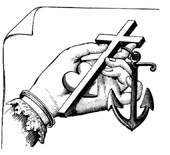
A Burden For Souls?
EDITORIAL
Catholics are not given to grabbing people by the collar, and asking, “Are you saved?” A Catholic is taught — and rightly so — to worry first about whether he himself is saved. To run around sticking one’s nose in other people’s business is to risk the sins of presumption and spiritual pride — presuming that “I’m saved, brother, and you’re not,” and taking prideful satisfaction in that perception.
But let’s say that we are working out our own salvation with properly Pauline fear and trembling. Let’s also say that we don’t presume to usurp God’s role as Judge. We’re even “nonjudgmental.” But in being nonjudgmental, is there not a risk of becoming dead to spiritual realities, of becoming undiscerning?
We Christians are called to discern the spirits — and it isn’t all that hard. Who has gazed at pictures of the savagery and brutality in, say, Bosnia — or a half dozen other battle zones at any given time — without realizing that he’s been looking into the face of evil?
But that’s boilerplate discernment — it’s culturally safe to be “judgmental” about other people’s wars. Let’s therefore bring the matter closer to home. Have you ever known a neighbor, relative, or work mate who is rather unmistakably ruining his life, sliding down the slope, heading straight for the Pit? Maybe it’s a teenager who’s already an alcoholic. Maybe it’s an adulterous acquaintance who will soon wreck a marriage and family. Perhaps it’s a colleague with a gambling addiction. Maybe it’s an old friend who is drug-addicted, can’t hold down a job, and is poised for a career in crime, and then jail. If you’ve known such a person, hasn’t your heart ached?
You May Also Enjoy
Educational Quackery... The Next Perversion... Roman Anabaptist?... Worse Than Just a Bad Day... Married Priesthood: What About Higher Clergy?... A Little Latin Is Enough... Ads Quoted From Pulpit...
As verbal engineering has preceded today's abortion culture, honest vocabulary is vital to restore life's protection.
Critics of Pope Pius XII's actions during the Holocaust put the Vatican in a position where it has to prove its innocence against every allegation.

